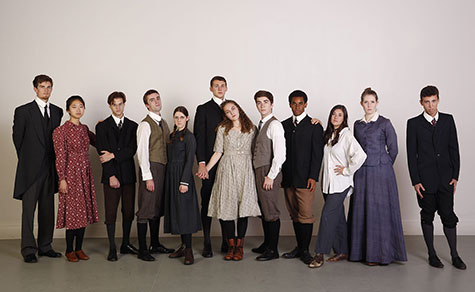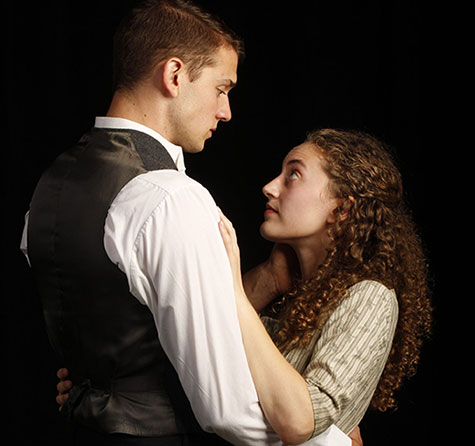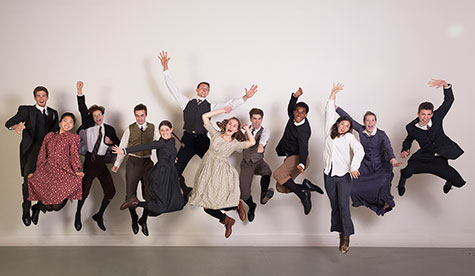
A girl asks awkward questions. A boy, frustrated by a dead language, erupts into a new one. Latin falls to rock ‘n’ roll.
Steven Sater’s Spring Awakening — with its blunt depictions of adolescent sexuality and startling mixture of contemporary expression and fin de siècle restraint — is among the most influential, unexpected and beloved Broadway shows of recent years.
|
In conjunction with the performances, playwright Steven Sater will present the PAD’s 12th Helen Clanton Morrin Lecture at noon Friday, Nov. 1. Titled “An Afternoon with Steven Sater,” the event is free and open to the public and takes place in Edison Theatre. For more information, call (314) 935-5858; email pad@artsci.wustl.edu or visit pad.artsci.wustl.edu. |
The recipient of eight Tony Awards and countless productions around the world, the play launched the careers of Lea Michele and Jonathan Drew Groff (Glee) and John Howard Gallagher Jr. (The Newsroom).
On Oct. 25, WUSTL’s Performing Arts Department (PAD) in Arts & Sciences will debut a new production of Spring Awakening in the University’s Edison Theatre. Shows run through Nov. 3.
“It’s more rock musical than traditional musical theater,” said director Andrea Urice, senior lecturer in drama. “The actors might be wearing 19th-century costumes, but they bounce around the stage with powerful, aggressive energy.
“Even when the subject matter is dark or sad, it’s a joyous, pleasurable show,” Urice added. “Characters break out of their confines; they grapple and feel and move.
“It’s liberating to watch.”
A shocking play
Sater, a WUSTL alumnus, based the book and lyrics on the 1891 play of the same title by German writer Frank Wedekind. Music is by the Grammy-nominated singer-songwriter Duncan Sheik. (Sater and Sheik previously collaborated on the album Phantom Moon, an homage to Nick Drake.)
Urice noted that Wedekind’s play proved extremely controversial and was not produced until 1906. “It deals very frankly with adolescent sexuality and the repressive educational/parental system,” she explained. “There’s masturbation, same-sex attraction, rape, pregnancy, abortion, suicide… It was a shocking play.
“And it’s still shocking today,” Urice said. “What’s brilliant about this adaptation is how Sater and Sheik have coupled the story with very contemporary music.
“The book scenes are very much of the period,”Urice added. “It’s a tightly wound world of black-and-white rules and societal pressures. But then you have the music, which takes you inside the characters’ hearts and minds.
“The songs become a visceral emotional manifestation of everything the characters are thinking and going through.”

Rock the boat
Set in provincial Germany in the late 1800s, the story centers on Melchior and Wendla, two young teenagers navigating the onset of sexual feeling as well as the adult world’s pitiless expectations.
“Melchior is a kind of golden boy,” Urice said. “He’s good at everything, but he also tends to rock the boat and push people’s buttons. Wendla is a good girl who obeys her parents, but she’s also a seeker. She asks questions. She wants to know what’s going on in the world.
“The third lead is Moritz, a friend of Melchior’s who is just failing on all accounts,” Urice continued. “He’s doing terribly in school. His father beats him. He doesn’t understand sexuality, but he’s obsessed with the things his body is telling him.”
To educate his friend, Melchior agrees to pen a kind of homemade pamphlet about sexual reproduction. It’s a decision that will have tragic consequences.
“In some ways, this is a brutal story,” Urice said. “But, particularly at emotionally critical moments, the music becomes a kind of interior monologue. It physicalizes and externalizes the characters’ feelings in really exciting ways.
“The world can be painful and difficult,” Urice concluded, “but by the end of the play, scales have fallen and eyes have been opened.
“We’re all left anticipating the summer that is to come.”
Cast and crew
Leading the cast of 13 is freshman Katie Greenberg as Wendla, junior Connor Duermit as Melchior and junior Adam Cohen as Moritz.
Also featured are freshman Sarah Gabriel, junior Liza Seiden and sophomore Susan Lee as Wendla’s friends Thea, Martha and Anna. Senior Ariel Saul is Ilse, a young woman rejected by her abusive parents.
Senior Connor McEvoy and sophomore Robert Landis are Hänschen and Ernst, classmates to Melchior and Mortiz. Other classmates include junior David Dwight and senior Jack Ritten, as the dreamers Georg and Otto.
Rounding out the cast are junior Anna Richards and senior Charles Morris, who between them portray all 14 adult roles.
Sets are by Rob Morgan, senior lecturer in drama. Costumes are by Laura Desch, a senior in the Sam Fox School of Design & Visual Arts. Lighting is by Sean Savoie, lecturer in the PAD. Sound design is by Matthew Koch.
Choreography is by Cecil Slaughter, senior lecturer in dance. Musical director is Patrick Blindauer. Stage manager is junior Claire Stark. Sarah Palay is assistant director.

Tickets
Performances of Spring Awakening will take place in Edison Theatre at 8 p.m. Friday and Saturday, Oct.25 and 26; and at 2 p.m. Sunday, Oct. 27. Performances will continue the following weekend, at 8 p.m. Friday and Saturday, Nov. 1 and 2; and at 2 p.m. Sunday, Nov. 3.
Edison Theatre is located in the Mallinckrodt Center, 6465 Forsyth Ave. Tickets are $15, or $10 for students, seniors and WUSTL faculty and staff. Tickets are available through the Edison Theatre Box Office, (314) 935-6543, and through all MetroTix outlets.
For more information, call (314) 935-6543 or visit padarts.wustl.edu.